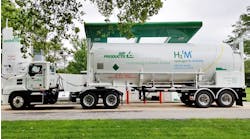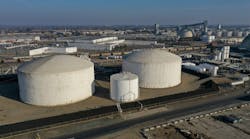Biodiesel producers believe they can capture 10% of the on-road diesel market by 2022. That vision for the future was laid out recently by the National Biodiesel Board (NBB).
"It is not about replacing every drop of petroleum; it is about continuing to diversify transportation energy so we can meet our needs affordably and sustainably," said National Biodiesel Board CEO Joe Jobe. "Biodiesel will play an increasing role to help protect fuel consumers and the US economy from unstable energy markets that are grossly distorted by political factors in the most politically unstable region in the world and by nationalized oil companies of totalitarian regimes."
Eight years ago NBB set a goal to be 5% of the diesel fuel supply by 2015, a goal then viewed as aggressive. With a billion gallons produced in 2011 and 2012, the biodiesel industry is well on its way to achieve that goal and possibly hit it earlier than expected.
Announced during the Biodiesel Conference & Expo, the industry's 10x22 goal envisions a more diversified future energy portfolio that would include biodiesel making up 10% of the diesel fuel supply. This goal is benchmarked to the on-road volumes but expected to be used in various blend levels in various applications. The goal is intended to be a stretch but yet attainable. It accounts for continuing technological breakthroughs in research on raw materials like one announced today.
Researchers at the Danforth Plant Science Center have developed technology that has demonstrated 2% and possibly higher increases in the oil content of soybeans. Preliminary data suggests these benefits occur without loss of yield or negative impacts on protein quality. The development has the potential to add one-half billion gallons of oil to the feedstock supply in the near term without negatively impacting soybean meal and animal feed.
The biodiesel industry already is accounting for the vast majority of the advanced biofuel production called for under the Federal Renewable Fuel Standard. As ongoing research continues to support more biodiesel growth the industry looks forward to the development and innovation that the coming decade will bring.








